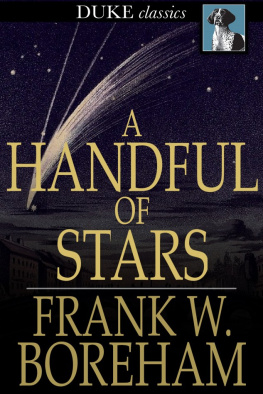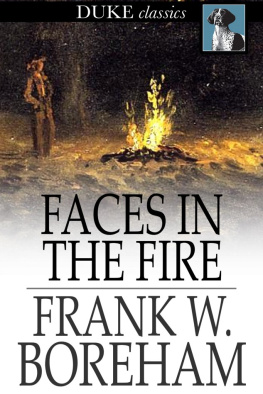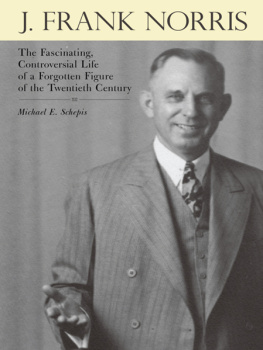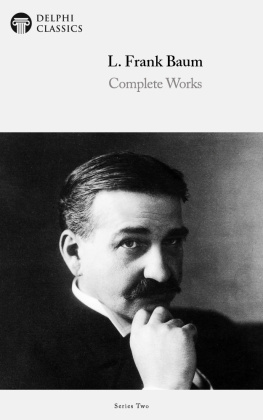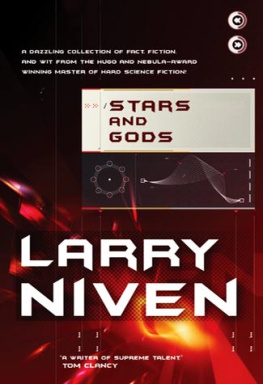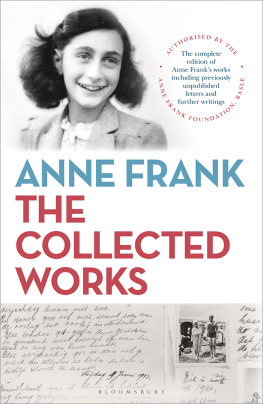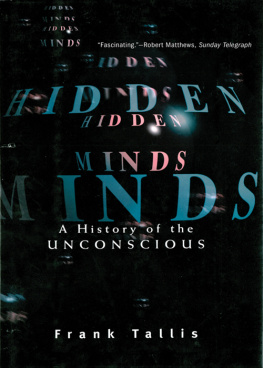A HANDFUL OF STARS
TEXTS THAT HAVE MOVED GREAT MINDS
* * *
FRANK W. BOREHAM
*
A Handful of Stars
Texts That Have Moved Great Minds
First published in 1922
ISBN 978-1-62013-493-1
Duke Classics
2013 Duke Classics and its licensors. All rights reserved.
While every effort has been used to ensure the accuracy and reliability of the information contained in this edition, Duke Classics does not assume liability or responsibility for any errors or omissions in this book. Duke Classics does not accept responsibility for loss suffered as a result of reliance upon the accuracy or currency of information contained in this book.
Contents
*
By Way of Introduction
*
It is not good that a book should be alone: this is a companion volumeto A Bunch of Everlastings. 'O God,' cried Caliban from the abyss,
O God, if you wish for our love,
Fling us a handful of stars!
The Height evidently accepted the challenge of the Depth. Heavenhungered for the love of Earth, and so the stars were thrown. I havegathered up a few, and, like children with their beads and berries, havethreaded them upon this string. It will be seen that they do not allbelong to the same constellation. Most of them shed their luster overthe stern realities of life: a few glittered in the firmament offiction. It matters little. A great romance is a portrait of humanity,painted by a master-hand. When the novelist employs the majestic wordsof revelation to transfigure the lives of his characters, he does sobecause, in actual experience, he finds those selfsame words indeliblyengraven upon the souls of men. And, after all, Sydney Carton's Textis really Charles Dickens' Text; Robinson Crusoe's Text is DanielDefoe's Text; the text that stands embedded in the pathos of UncleTom's Cabin is the text that Mrs. Harriet Beecher Stowe had enthronedwithin her heart. Moreover, to whatever group these splendid orbsbelong, their deathless radiance has been derived, in every case, fromthe perennial Fountain of all Beauty and Brightness.
Frank W. Boreham.
Armadale, Melbourne, Australia.
I - William Penn's Text
*
I
The Algonquin chiefs are gathered in solemn conclave. They make a wildand striking and picturesque group. They are assembled under thewide-spreading branches of a giant elm, not far from the banks of theDelaware. It is easy to see that something altogether unusual is afoot.Ranging themselves in the form of a crescent, these men of scarred limbsand fierce visage fasten their eyes curiously upon a white man who,standing against the bole of the elm, comes to them as white man nevercame before. He is a young man of about eight and thirty, wearing abouthis lithe and well-knit figure a sash of skyblue silk. He is tall,handsome and of commanding presence. His movements are easy, agile andathletic; his manner is courtly, graceful and pleasing; his voice,whilst deep and firm, is soft and agreeable; his face inspires instantconfidence. He has large lustrous eyes which seem to corroborate andconfirm every word that falls from his lips. These tattooed warriorsread him through and through, as they have trained themselves to do, andthey feel that they can trust him. In his hand he holds a roll ofparchment. For this young man in the skyblue sash is William Penn. He ismaking his famous treaty with the Indians. It is one of the mostremarkable instruments ever completed. 'It is the only treaty,' Voltairedeclares, 'that was ever made without an oath, and the only treaty thatnever was broken.' By means of this treaty with the Indians, WilliamPenn is beginning to realize the greatest aspiration of his life. ForWilliam Penn has set his heart on being the Conqueror of the World!
II
Strangely enough, it was a Quaker who fired the young man's fancy withthis proud ambition. Thomas Loe was William Penn's good angel. Thereseemed to be no reason why their paths should cross, yet their pathswere always crossing. A subtle and inexplicable magnetism drew themtogether. Penn's fatherSir William Pennwas an admiral, owning anestate in Ireland. When William was but a small boy, Thomas Loe visitedCork. The coming of the Quaker caused a mild sensation; nobody knew whatto make of it. Moved largely by curiosity, the admiral invited thequaint preacher to visit him. He did so, and, before leaving, addressedthe assembled household. William was too young to understand, but he wasstartled when, in the midst of the address, a colored servant weptaloud. The boy turned in his astonishment to his father, only to noticethat tears were making their way down the bronzed cheeks of the admiral.The incident filled him with wonder and perplexity. He never forgot it.It left upon his mind an indelible impression of the intense reality ofall things spiritual. As a schoolboy, he would wander in the foreststhat so richly surrounded his Essex home, and give himself to rapt andsilent contemplation. On one occasion, he tells us, he 'was suddenlysurprised with an inward comfort.' It seemed to him as if a heavenlyglory irradiated the room in which he was sitting. He felt that he couldnever afterwards doubt the existence of God nor question the possibilityof the soul's access to Him.
It was at Oxford that the boy's path crossed that of the Quaker for thesecond time. When, as a lad of sixteen, William Penn went up to theUniversity, he found to his surprise that Oxford was the home of ThomasLoe. There the good man had already suffered imprisonment for consciencesake. The personality of the Quaker appealed to the reflectivetemperament of the young student, whilst the good man's sufferings forhis convictions awoke his profoundest sympathies. To the horror of hisfather, he ardently espoused the persecuted cause, involving himself insuch disfavor with the authorities of the University that theyperemptorily ordered his dismissal.
But it was the third crossing of the paths that most deeply andpermanently affected the destinies of William Penn. Soon after hisexpulsion from Oxford, he was appointed Victualler of the Squadron lyingoff Kinsale, and was authorized to reside at, and manage, his father'sIrish estate. It was whilst he was thus engaged that Thomas Loere-visited Cork. Penn, of course, attended the meetings. 'It was inthis way,' he tells us, 'that God, in His everlasting kindness, guidedmy feet in the flower of my youth, when about two and twenty years ofage. He visited me with a certain testimony of His eternal Word througha Quaker named Thomas Loe.' The text at that memorable and historicservice, like a nail in a sure place, fastened itself upon the mind ofthe young officer. Thomas Loe preached from the words: 'This is thevictory that overcometh the world, even our faith.'
The faith that overcomes!
The faith by which a man may conquer the world!
The faith that is itself a victory!
'This is the victory that overcometh the world, even our faith!'
Penn was electrified. His whole being was stirred to its depths. 'Theundying fires of enthusiasm at once blazed up within him,' one recorddeclares. 'He was exceedingly reached and wept much,' the Quakerchronicle assures us. He renounced every hope that he had ever cherishedin order that he might realize this one. This was in 1666the year inwhich London was devoured by the flames.
'Penn's conversion,' says Dr. Stoughton, 'was now completed. Thatconversion must not be regarded simply as a change of opinion. Itpenetrated his moral nature. It made him a new man. He rose into anothersphere of spiritual life and consciousness.'

